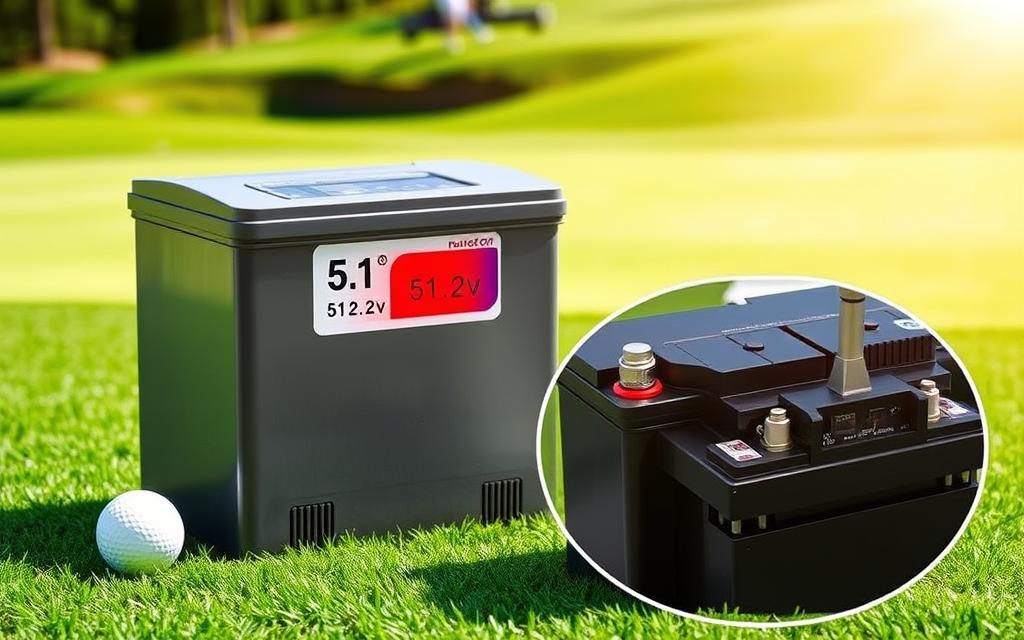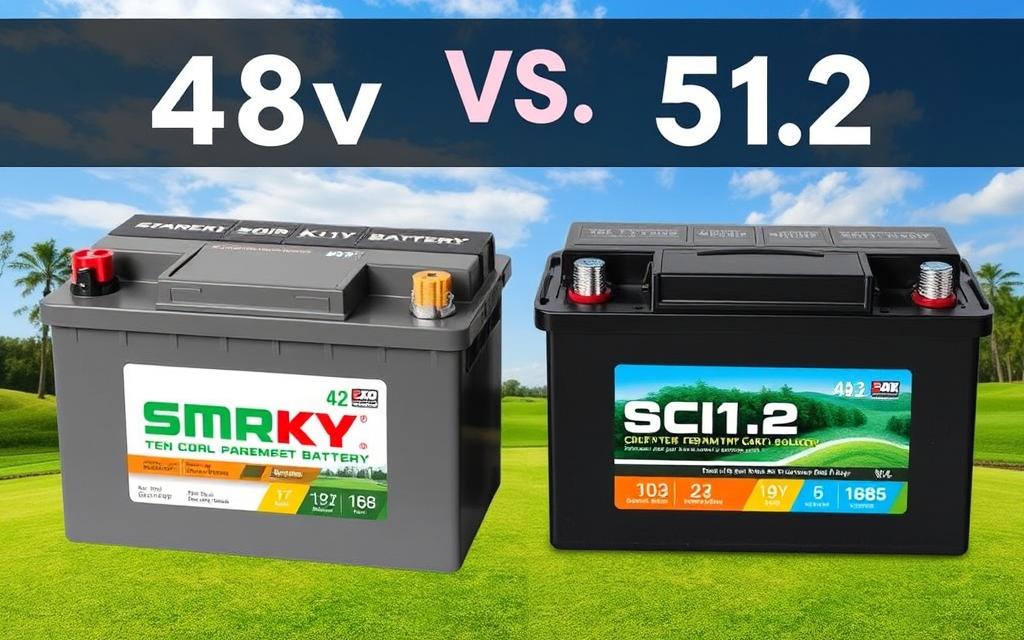I’ve always loved golf and watched how golf cart tech has grown. The changes have made driving better. Now, we see 48v and 51.2v batteries. I’ll share what makes them different, helping you choose the right one for your game.
Key Takeaways
- Understand the technical specifications and performance differences between 48v and 51.2v golf cart batteries.
- Explore the benefits of each voltage option to determine which one best suits your golf cart’s requirements.
- Discover how battery type and chemistry can impact range, runtime, and overall performance.
- Learn about the importance of proper charging and maintenance for optimal battery life.
- Compare the cost considerations between 48v and 51.2v golf cart batteries.
Introduction to Golf Cart Battery Voltages
As a golf fan, knowing your cart’s battery system is key. Golf carts usually have 48v or 51.2v batteries. The voltage affects how well your cart works and what it can do. We’ll look at these ratings and why picking the right one matters for your game.
Understanding Battery Voltage Ratings
The voltage of a golf cart battery pack shows its total power. For example, a 48v pack has four 12v batteries together. A 51.2v pack might have four 12.8v lithium-ion batteries. The higher voltage means more power and speed for your cart.
Importance of Choosing the Right Voltage
Picking the right voltage for your cart is very important. It affects how well your cart performs, how far it goes, and if it works with accessories. Higher voltages, like 51.2v, give more power and last longer. They’re good for hills or heavy loads. But, 48v batteries might be better for flat areas or lighter use.

Learning about golf cart battery voltages helps you choose wisely. We’ll look at the differences between 48v and 51.2v batteries. We’ll also talk about battery types and what to consider when buying.
What’s the Difference Between 48v and 51.2v Golf Cart Batteries
Golf cart batteries come in two main types: 48v and 51.2v. The main difference is their voltage. A 48v battery has four 12-volt batteries. A 51.2v battery has sixteen 3.2-volt lithium-ion cells. This makes 51.2v batteries perform better in some ways.
Voltage Specifications Explained
The voltage of a golf cart battery is key. It affects how well the battery works and if it fits your cart. A 48v battery has four 12-volt batteries, making it the standard for many carts. On the other hand, a 51.2v battery has sixteen 3.2-volt cells, giving it a higher voltage.
The higher voltage in 51.2v batteries means better power and longer runs. They can go faster up hills and last longer on a single charge. But, make sure your cart can handle the higher voltage to avoid damage.

Choosing between 48v and 51.2v batteries depends on your needs and cart. Knowing about voltage helps you pick the best for your golfing fun.
Benefits of 48v Golf Cart Batteries
48v lead-acid batteries are a top pick for golf cart power. They are strong, affordable, and great for everyday use.
These batteries have a lot of battery capacity and runtime. They last long and give lots of power. This means your golf cart can handle the course well. Plus, they work with many golf cart models and accessories.
48v lead-acid golf cart batteries are also deep cycle. They can handle being used a lot without losing power. This makes them perfect for playing golf or going off-road.
| Battery Type | Voltage | Battery Capacity (Ah) | Runtime (hours) |
|---|---|---|---|
| 48v Lead-Acid Golf Cart Battery | 48V | 220Ah | 6-8 hours |
48v golf cart batteries are easy to find and not expensive. This makes them a great choice for keeping your cart running well for a long time.
“The 48v lead-acid batteries in my golf cart have provided consistent and reliable performance, allowing me to enjoy my rounds without worrying about running out of juice.”
In summary, 48v golf cart batteries are a smart and affordable choice. They offer great capacity, runtime, and fit many carts. They are a good investment for golf cart lovers.
Advantages of 51.2v Golf Cart Batteries
Choosing between 48v and 51.2v batteries for your golf cart matters a lot. As a golf fan, I’ve seen how 51.2v golf cart batteries with lithium-ion chemistry stand out.
Increased Range and Runtime
51.2v lithium-ion golf cart batteries give you more range and runtime. They have more power, so your cart goes farther and longer without needing a charge. This is great for golfers who play on big courses or travel far during a round.
Lithium-ion batteries also last longer than old lead-acid ones. This means your cart works well for a longer time. You won’t need to replace batteries as often, saving you money.
| Battery Specification | 48v Lead-Acid | 51.2v Lithium-Ion |
|---|---|---|
| Battery Capacity | 100Ah | 100Ah |
| Battery Runtime | Up to 18 holes | Up to 27 holes |
| Battery Charging Time | 8-12 hours | 2-4 hours |
The table shows how 51.2v lithium-ion batteries beat 48v lead-acid ones. They last longer and charge faster, making golfing better.
“The increased power and runtime of 51.2v golf cart batteries have been a game-changer for me. I no longer have to worry about my cart running out of juice during a long round, and the faster charging time is a welcome convenience.”
In summary, 51.2v golf cart batteries, and lithium-ion ones in particular, are a top choice. They offer more power, longer use, and quicker charging. These benefits make your golf game better.

Golf Cart Battery Types and Chemistries
You have two main battery choices for your golf cart: lead-acid and lithium-ion. Each has its own benefits and things to think about for golf cart owners.
Lead-Acid Golf Cart Batteries
Lead-acid batteries are a common choice for golf carts. They are affordable and reliable. Deep-cycle lead-acid batteries are great for golf carts because they handle being used a lot.
Lithium-Ion Golf Cart Batteries
Lithium-ion batteries are becoming more popular in golf carts. They have more energy, last longer, and charge faster. Golfers who want to go longer without needing to charge like these batteries.
| Feature | Lead-Acid Batteries | Lithium-Ion Batteries |
|---|---|---|
| Battery Capacity | Typically range from 100 to 200 Ah | Typically range from 50 to 100 Ah |
| Battery Runtime | Generally provide longer runtime per charge | Offer improved runtime compared to lead-acid |
| Charging Time | Require longer charging times, typically 8-12 hours | Charge more quickly, often in 2-4 hours |
| Lifespan | Typically last 3-5 years with proper maintenance | Can last 5-10 years with proper care |
| Weight | Heavier than lithium-ion batteries | Lighter weight compared to lead-acid |
When picking between lead-acid and lithium-ion batteries, think about battery capacity, runtime, charging needs, and cost. Knowing the good points of each can help you choose the best for your golfing needs.

Battery Capacity and Performance Considerations
Choosing the right golf cart batteries is key. Look at capacity and performance. The battery’s amp-hours (Ah) affect how long it runs. Lithium-ion and lead-acid batteries with more capacity last longer.
It’s also vital for the battery to keep power steady as it runs out. This keeps your cart running well, even when it’s almost empty. Think about the battery’s capacity and how long it lasts to choose the best one for you.
| Battery Type | Capacity (Ah) | Typical Runtime |
|---|---|---|
| Lead-Acid | 150-300 Ah | 18-36 holes |
| Lithium-Ion | 100-200 Ah | 30-50 miles |
“Evaluating golf cart battery capacity and performance is crucial for ensuring a seamless, reliable driving experience.”
Think about what you need from your golf cart battery. This will help you pick the right one for your needs and budget. You’ll enjoy your golf cart more, whether you’re playing close to home or far away.

Charging and Maintenance Requirements
Proper charging and maintenance are key for your golf cart’s batteries. Whether you have lead-acid or lithium-ion golf cart batteries, knowing the right charging and care can greatly help. It makes your cart run better and last longer.
Proper Charging Techniques
Lead-acid batteries need a special charger and should not be overcharged. They have a specific charge process to stay in top shape. Lithium-ion batteries can usually be charged with a standard charger. But, always follow the maker’s advice for safe and effective golf cart battery charging.
- Use a dedicated golf cart charger for lead-acid batteries
- Avoid overcharging lead-acid batteries
- Follow the manufacturer’s instructions for lithium-ion battery charging
Regular battery maintenance is also important. Clean the battery terminals and check the electrolyte levels (for lead-acid batteries). By charging and caring for your batteries right, you’ll have a great golfing experience for many years.
“Proper charging and maintenance are the keys to getting the most out of your golf cart batteries, whether they’re lead-acid or lithium-ion.”
Cost Comparison: 48v vs 51.2v Golf Cart Batteries
Choosing the right golf cart battery is important. The cost difference between 48v and 51.2v batteries is big. It’s key for golfers to know this to make a smart choice.
48v lead-acid golf cart batteries are cheaper. They are a good pick for those who want to save money. These batteries have a lower price at first, which is great for budgeting.
51.2v lithium-ion golf cart batteries cost more upfront. But, they save money in the long run. They last longer and need less upkeep, making them worth the extra cost.
The price gap between 48v and 51.2v batteries changes based on many things. Brand, type, and where you buy it all play a part. It’s smart to shop around to get the best deal.
| Battery Type | Average Cost | Lifespan | Maintenance Requirements |
|---|---|---|---|
| 48v Lead-Acid | $600 – $900 | 3-5 years | Regular watering and cleaning |
| 51.2v Lithium-Ion | $1,200 – $1,800 | 5-8 years | Minimal maintenance |
Thinking about the long-term costs helps golfers choose wisely. The right battery depends on what you need and can afford. It’s all about what matters most to you.
Choosing the Right Battery for Your Golf Cart
When picking a battery for your golf cart, look at more than just voltage. You need to think about other important specs and how they perform. This helps make sure your golf cart runs well with the right battery.
Factors to Consider
When looking at what’s the difference between 48v and 51.2v golf cart batteries, remember these points:
- Expected runtime: Think about how long you need the battery to last. This helps pick the right golf cart battery capacity and voltage.
- Charging time: Consider how long it takes to charge the battery. This affects how easy it is to use your golf cart.
- Maintenance requirements: Check what upkeep the battery needs. This ensures it lasts long and works well.
- Compatibility: Make sure the golf cart battery specifications fit your cart and its electrical setup.
- Budget: Think about the cost of the battery and what it will cost to run it over time.
By thinking about these things, you can choose the golf cart battery voltage that’s best for you.
“Choosing the right battery is essential for ensuring your golf cart’s optimal performance and longevity.”
Conclusion
Choosing between 48v and 51.2v golf cart batteries depends on what you need. 48v lead-acid batteries are cheaper and work with many systems. But, 51.2v lithium-ion batteries give better performance and use less energy.
Knowing the differences in voltage, chemistry, capacity, and cost helps you decide. This way, you pick the best batteries for your golf cart and driving style.
It’s important to take good care of your batteries, no matter the voltage. Keeping your batteries in top shape ensures they last long and work well. This care is key to getting the most from your investment.
When looking at golf cart batteries, remember to consider voltage, type, capacity, and cost. Think about these carefully to find the right batteries for you. This will improve your golfing or fun rides.


